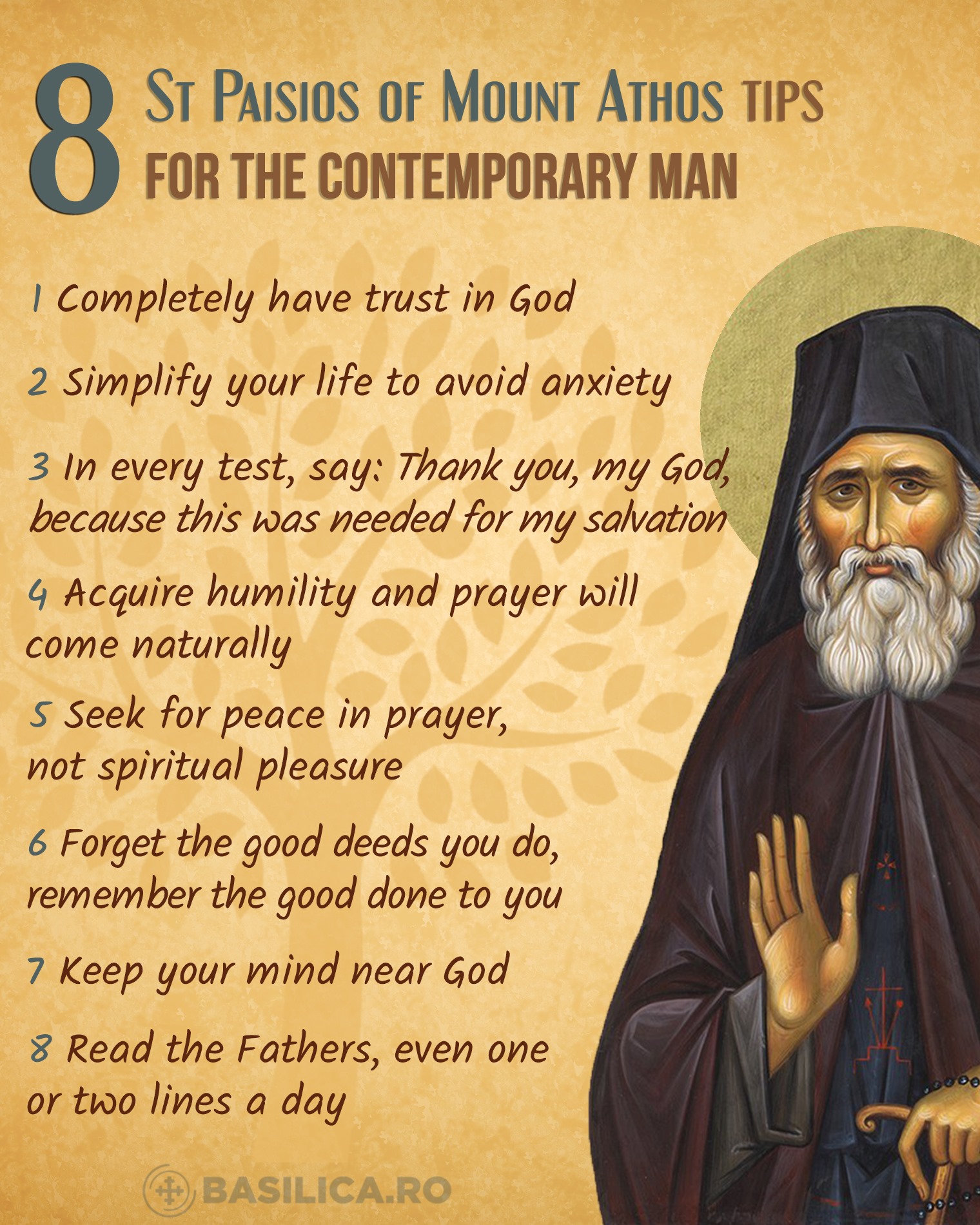
Life in Christ implies full trust in God, but also carefully organising everyday life. Here are some recommendations from one of the Athonite Elders, St. Paisios of Mount Athos.

Life in Christ implies full trust in God, but also carefully organising everyday life. Here are some recommendations from one of the Athonite Elders, St. Paisios of Mount Athos.
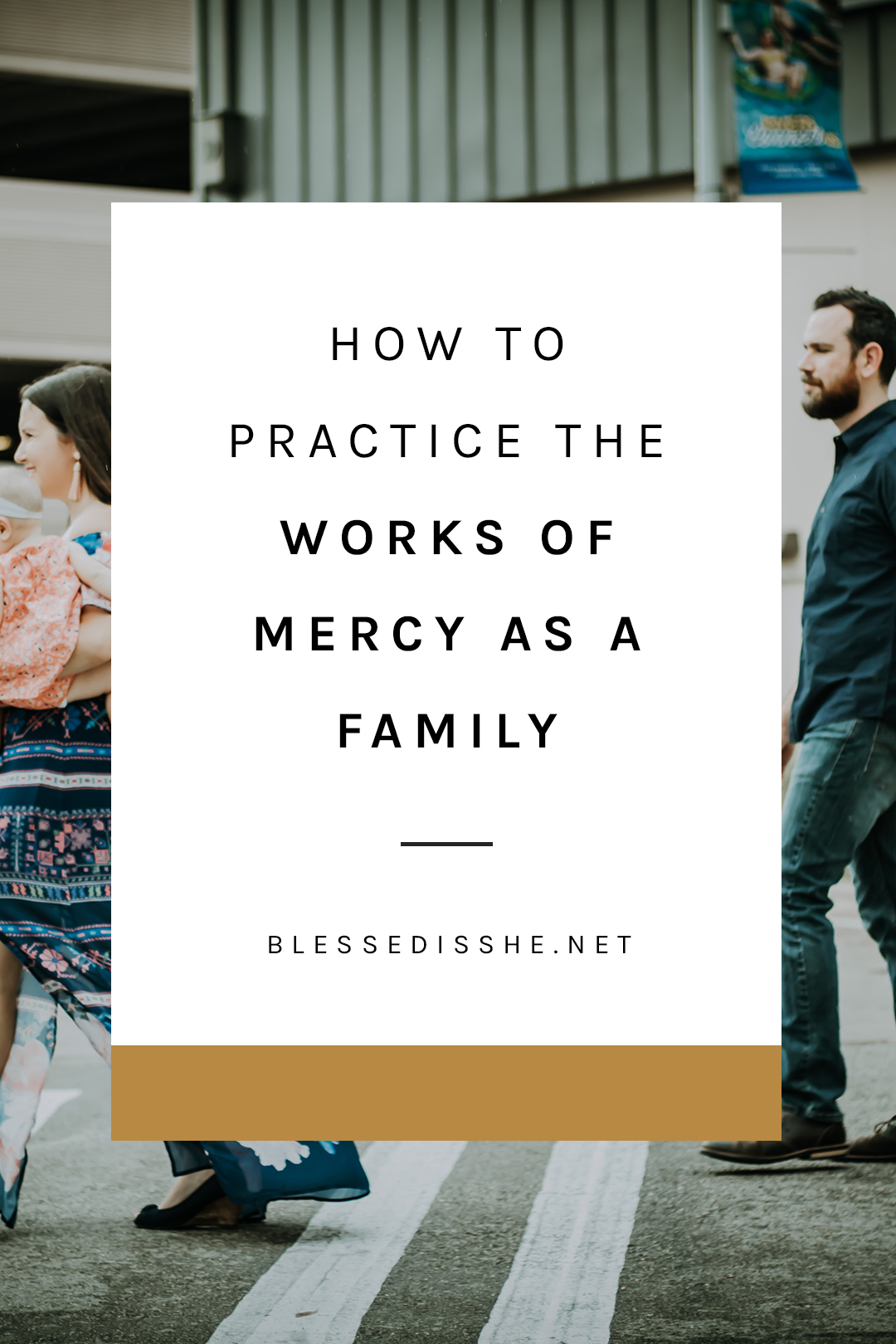 “As Mothers, We Live the Works of Mercy Each Day in Our Homes”
“As Mothers, We Live the Works of Mercy Each Day in Our Homes”
Blessed is She is an online community of women living the Gospel and the faith in their particular context.
Daily we are called to be protagonists in the works of mercy. Here is a resource.
Give some consideration to the veneration of Icons.![]()
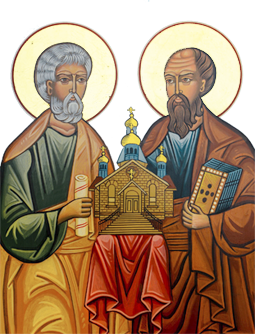 The feast day for the Apostles of Rome and early founders of the Church –Saints Peter and Paul– is on Saturday, June 29.
The feast day for the Apostles of Rome and early founders of the Church –Saints Peter and Paul– is on Saturday, June 29.
The Divine Liturgy will be served at 9:00 a.m. in English and Ukrainian.
The Church’s spiritual tradition has us observing the Fast of the Holy Apostles (Petrivka) as a way to deepen our relationship with the Lord and His preaching of Salvation through the ministry of Ss. Peter and Paul. The Fast has been observed from Monday after All Saints Sunday until the feast day on June 29 (or July 12 – Julian Calendar).
As a Church we honor the memory of the chief apostles by attending the Divine Liturgy. The Bishops have designated this day as a holy day of love (obligation).
In our catechism, Christ Our Pascha, we read: “The apostles, Christ’s disciples, received the Word of God and proclaimed the good news about him to the whole world. They witnessed to Christ by the word of their preaching and by the example of their lives. The mission of the apostles was taken up by their successors, the Holy Fathers of the Church, who preserved and safeguarded the unbroken continuity of Apostolic Tradition by means of the episcopal succession down to our times.”
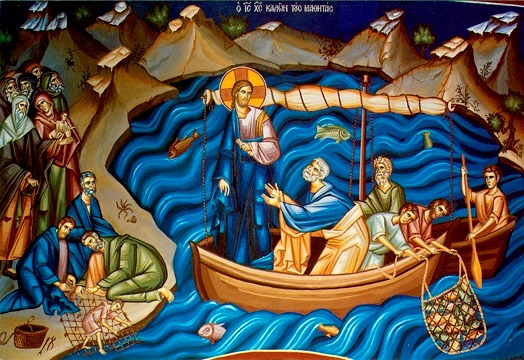 Read: Romans 2:10-16; Matthew 4:18-23
Read: Romans 2:10-16; Matthew 4:18-23
My favorite poet is a Jesuit priest who lived in the 19th century, and wrote about our faith. His name is Gerard Manley Hopkins, and though he was unknown in his lifetime, he changed English poetry. He wrote of our life in Christ:
In a flash, at a trumpet crash,
I am all at once what Christ is, since he was what I am, and
This Jack, joke, poor potsherd, patch, matchwood, immortal diamond,
Is immortal diamond.
This is what happens in today’s Gospel. Jesus calls Peter and Andrew and John and James, ordinary fishermen, and they IMMEDIATELY follow him. They become “immortal diamond,” oh —after one weakness when they run away at Jesus’ arrest, but then finally “in a flash” by the coming of the Holy Spirit.
St. Paul witnesses: “Consider your own calling, brothers. Not many of you were wise by human standards, not many were powerful, not many were of noble birth. Rather, God chose the foolish of the world to shame the wise, and God chose the weak of the world to shame the strong,” (1 Corinthians 1:26-27).
Today, though, especially because of mass media, the greatest fear we have is of being “ordinary.” We are unsure of ourselves, and we do not want to ever admit that we are or ever have been “ordinary.” Our problem is lack of faith. We want to become “immortal diamond” on our own terms, not from God’s calling. This is the sin of Adam and Eve, we want to “do it our way.” We have no humility, we do not trust in God’s plan.
Today’s gospel tells us differently —we don’t get the fifteen minutes of false glory that the world gives, but immortal life in Christ. Today we are Simon and Andrew and James and John, hearing the voice of Jesus, “Come, follow me.” Today we hear the Lord calling us calling us to a life like his of caring for others and proclaiming the gospel, if not by words, by our actions and lives. We cannot ignore this call. And St. Paul promises in the epistle “There will be glory, honor, and peace for everyone who does good, Jew first and then Greek. There is no partiality with God” (Romans 2:15-16).
Meditation by Archpriest David Petras
#ByzantineCatholicNew Haven
#stmichaelnewhaven
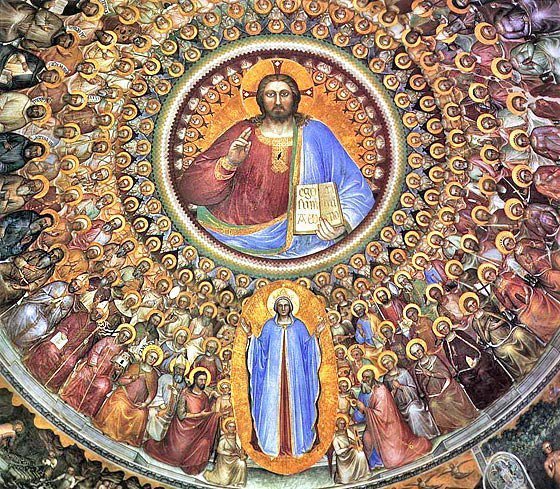 The Greek Church celebrates the great company of saints today. The Latin Church celebrates All Saints on November 1.
The Greek Church celebrates the great company of saints today. The Latin Church celebrates All Saints on November 1.
“The Church of Christ honors even after their death those who have lived a truly godly life. Every day of the year it commemorates the saints who departed hence on that day, leaving this mortal life. It sets the life of each of them before us for our benefit, and also shows us how each died, whether they fell asleep in peace or ended their lives in martyrdom. On this day, however, the Church gathers them all together and sends up a common hymn in their honor.”
(By St. Gregory Palamas – 1296-1358)
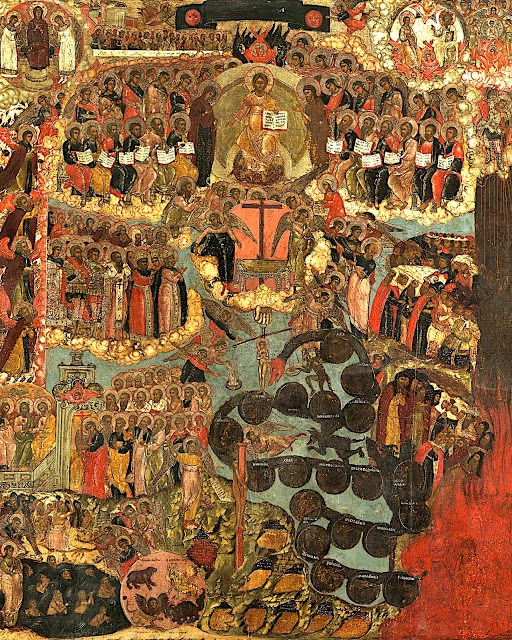 ***Nota Bene: Divine Liturgy this morning at 9:00 a.m.
***Nota Bene: Divine Liturgy this morning at 9:00 a.m.
****Father will be praying for the souls (blessing the graves) this weekend at the cemeteries: All Saints this morning beginning at 11am and tomorrow at St Lawrence at 12:30pm.
On this day, the Saturday before Holy Pentecost, we celebrate a memorial for all those who have fallen asleep since the ages in true worship and in the hope of everlasting life. The Holy Fathers established that on this Saturday that precedes Holy Pentecost, we observe the memory of all people who throughout the centuries died in the right faith, just as they ordered that this be observed on the Saturday before Meatfare Sunday. They did this moved by their love for mankind, so that all who for whatever reason did not have the usual benefit of individual memorial services might be included in this common memorial. According to tradition, the Fathers of the Church received this injunction concerning the memorial services from the Apostles, who themselves taught that the memorials performed on behalf of the reposed bring great benefit to those who have fallen asleep. (See Apostolic Injunctions, 8.42)
The Holy Fathers specified that we perform them today, because tomorrow we shall welcome the All-Holy Spirit and shall fervently be entreating the Lord for ourselves, that He send us His All-Holy Spirit to illumine us and strengthen us in the fear of God and in keeping the commandments and to guide us in obtaining eternal life. We shall also be praying for the deceased, that He give them rest in His lovely and longed-for dwellings. In praying for the dead, on the one hand, we show our love for our deceased fathers and brothers, and, on the other hand, we become more keenly aware of the vanity of this world, and thus we receive great benefit to our souls.
For nothing rouses the slothful to repentance better than the recollection of death. And nothing else brings us the recollection of death as well as the memory of our loved ones who have slept the eternal sleep. O Master Christ, grant repose in the dwelling places of the righteous to the souls of those who have preceded us in slumber, and have mercy on us and save us, for You alone love mankind. Amen. (Synaxarion of the Lenten Triodion and Pentecostarion, edited by Fr. David (Kidd) and Mother Gabriella (Ursache), HDM Press, River Junction, Michigan, 1999, pp. 228-229.)
This may have been a “Christianization” of a pagan custom. Spring was a time of release of the souls of children or maidens who had committed suicide or met a violent death. During rusalki these spirits were treated with pity and wreaths of flowers were offered to them. This feast was called rosalia in Latin and anthesteria in Greek and became associated with Pentecost because it was a spring feast. (George P. Fedotov, The Russian Religious Mind, Vol. I (Belmont, Massachusetts: Nordland Publishing Co.,1985), 18.)
Note that the day before Pentecost itself is a commemoration of all the departed, yet another confrontation with the mystery of death and the hope of the general resurrection.
Meditation by Archpriest David Petras
#ByzantineCatholicNewHaven
#stmichaelnewhaven
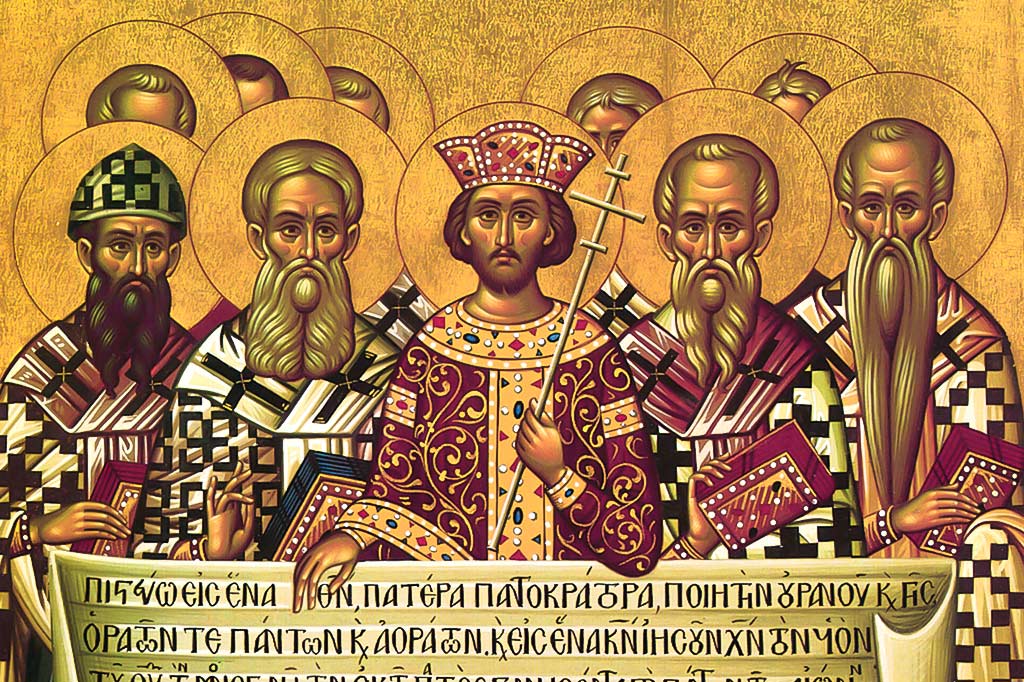 “Holy Father, keep them in your name that you have given me, so that they may be one just as we are. (John 17:11)”
“Holy Father, keep them in your name that you have given me, so that they may be one just as we are. (John 17:11)”
After the Resurrection, Jesus appeared to his followers for forty days. He did not live with them on a day to day basis, as he did before his crucifixion and death, but he rose now into glory, giving us also the hope of resurrection to eternal life. His appearances had a particular goal, as he explained later in the Gospel of John, but in the same discourse we have heard today, “As you sent me into the world, so I sent them into the world. (John 17:18): The Gospel today begins, “Father, the hour has come. Give glory to your son, so that your son may glorify you, just as you gave him authority over all people, so that he may give eternal life to all you gave him” (John 17:1-2). In the Gospel of St. Matthew, as Jesus leaves his followers, he give them this commission, “All power in heaven and on earth has been given to me. Go, therefore, and make disciples of all nations, baptizing them in the name of the Father, and of the Son, and of the holy Spirit” (Matthew 28:18-19). After his crucifixion and resurrection, Jesus is glorified, he has all power and authority, and he passes on his mission to us by giving us the Holy Spirit at Pentecost.
Some of the Fathers of the Church have asked the question: “Why didn’t our Lord stay with us in his risen glory and give us clear guidance in the building up of his kingdom? Why did he leave us and return to the Father, where as God he reigns with the Father eternally, and now sits at his right now also in the human nature that he took for our salvation?” We might muse – it certainly would make it easier for us if Jesus stayed visibly with us and would be the power of our faith in the world. He left us, though because of God’s wisdom. If he stayed with us, we might perceive him as a tyrant, but his whole earthly mission was exactly NOT to establish an earthly political kingdom, but to establish the Kingdom of God, which can exist only in an atmosphere of complete human freedom. In other words, it is now up to us, by loving God and our neighbor freely, by freely doing the will of God to build up this kingdom. At the same time, God did not leave us entirely on our own. He promised, I tell you the truth, it is better for you that I go. For if I do not go, the Advocate will not come to you. But if I go, I will send him to you. (John 16:7)” We have received the Advocate, the Holy Spirit, in our baptisms. The priest has anointed us with chrism, saying, “The gift of the Holy Spirit.” Again, St. John teaches, “As for you, the anointing that you received from him remains in you, so that you do not need anyone to teach you. But his anointing teaches you about everything and is true and not false; just as it taught you, remain in him” (1 John 2:27). We cannot build up God’s kingdom by our own human strength, but only by the power of the Holy Spirit given to us.
How do we build up this kingdom? Again, today’s Gospel tells us that it comes about only by building up unity in God. Our goal is to find God in the gift of life given to us. We find him only by being one with him, as the Father and the Son are one, as Jesus clearly tells us, “Holy Father, keep them in your name that you have given me, so that they may be one just as we are” (John 17:11). Moreover, the Gospel of St. Matthew tells us that we become one when we see the image of God in every person that he has created. When Christ does come again in glory, he will judge us exactly on this point, “‘Amen, I say to you, whatever you did for one of these least brothers of mine, you did for me” (Matthew 25:40). We become one with God only by becoming one with each other, and we can become one with each other only if we love the poor, if we feed the hungry, if we give drink to the thirsty, if we give a home to the homeless, if we visit those who are sick or in prison, only if we see the face of Christ in the face of one another.
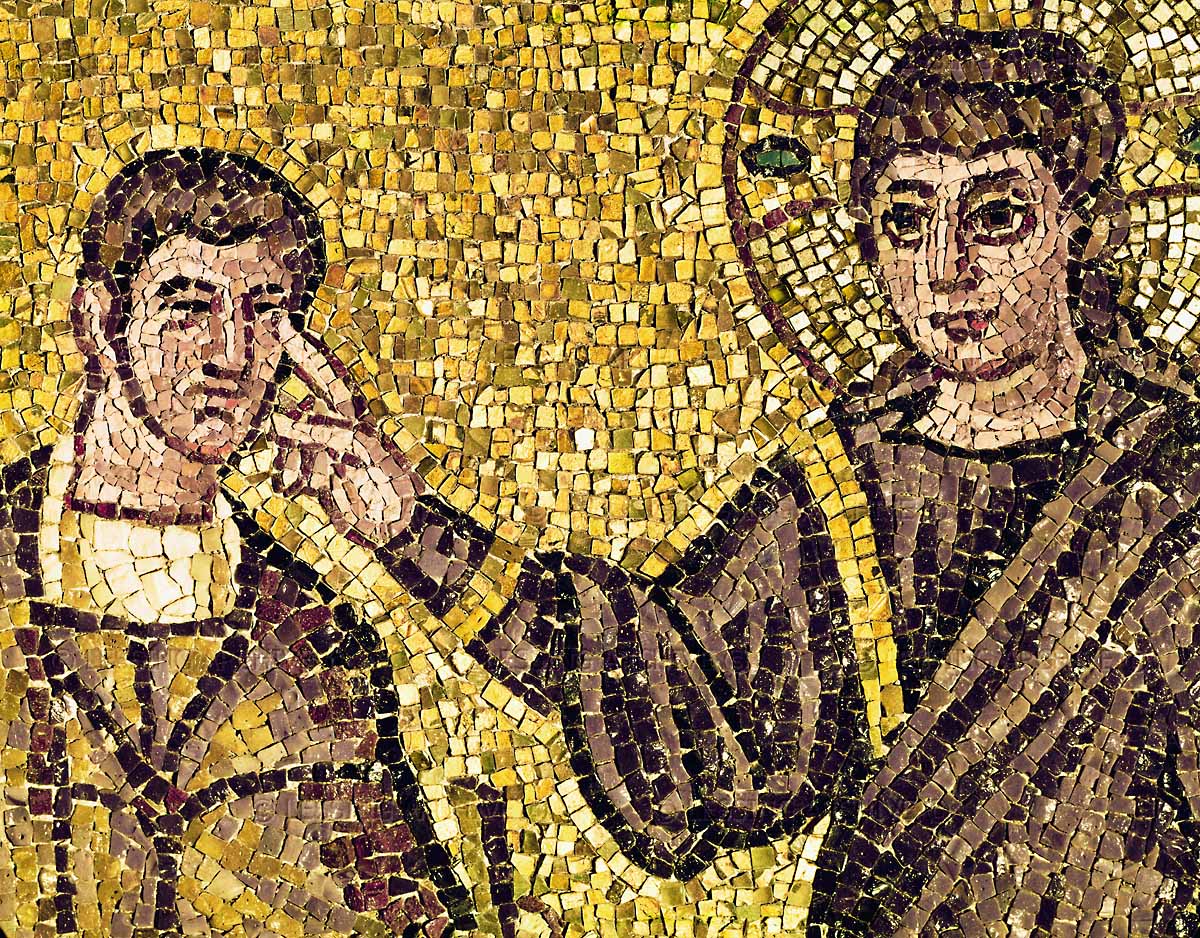
The story of the Man Born Blind is the third Sunday Gospel in Pascha about the mystery of baptism. This gospel is very clear, “Jesus spat on the ground and made clay with the saliva, and smeared the clay on his the blind man’s) eyes, and said to him, “Go wash in the Pool of Siloam” (which means Sent). So he went and washed, and came back able to see. (John 9:6-7)” The clay represents the anointing we receive at baptism, making us “Anointed Ones,” (Christs, or Christians) and the washing represents the washing in the water of baptism.
The blind man can then see, he is “enlightened,” the name the Church gives to baptism. Two observations: to be truly enlightened, we need humility. We need to know that only God can give us the vision we need. To do that, we cannot rely on our own “opinions,” we must hear his Word in the gospel, we must worship him with his people, we must be attentive to the voice of his shepherds in the teaching of the Church. If we believe only in ourselves, we risk condemnation, as Jesus told the Pharisees, “If you were blind, you would have no sin; but now you are saying, ‘We see,’ so your sin remains” (John 9:41). True knowledge comes only from the Holy Spirit, “But you have an anointing from the Holy One, and you know all things” (1 John 2:20).
The second observation is that in these three weeks, our Lord calls to baptism the most unlikely people: a friendless man lying lame by a pool, a shameless woman with serial husbands, and a blind man about whom the disciples ask, “Rabbi, who sinned, this man or his parents, that he was born blind?” (John 9:2). Jesus responds, “Neither he nor his parents sinned; it is so that the works of God might be made visible through him (John 9:3), thus separating the wrath of God from the judgment of sin. God truly hates evil, which brings death and failure, but he loves the sinner with infinite divine love. If we suffer because of our sins, it is because that is the “wages” of sin (Romans 6:23). We see in these three Sundays that God is merciful and wishes the salvation of all. He calls us all to enlightenment in baptism, so that we can live in the Holy Spirit and profess with the formerly blind man, now enlightened, “I do believe, Lord!” (John 9:38).
Meditation by Archpriest David Petras
#ByzantineCatholicNewHaven
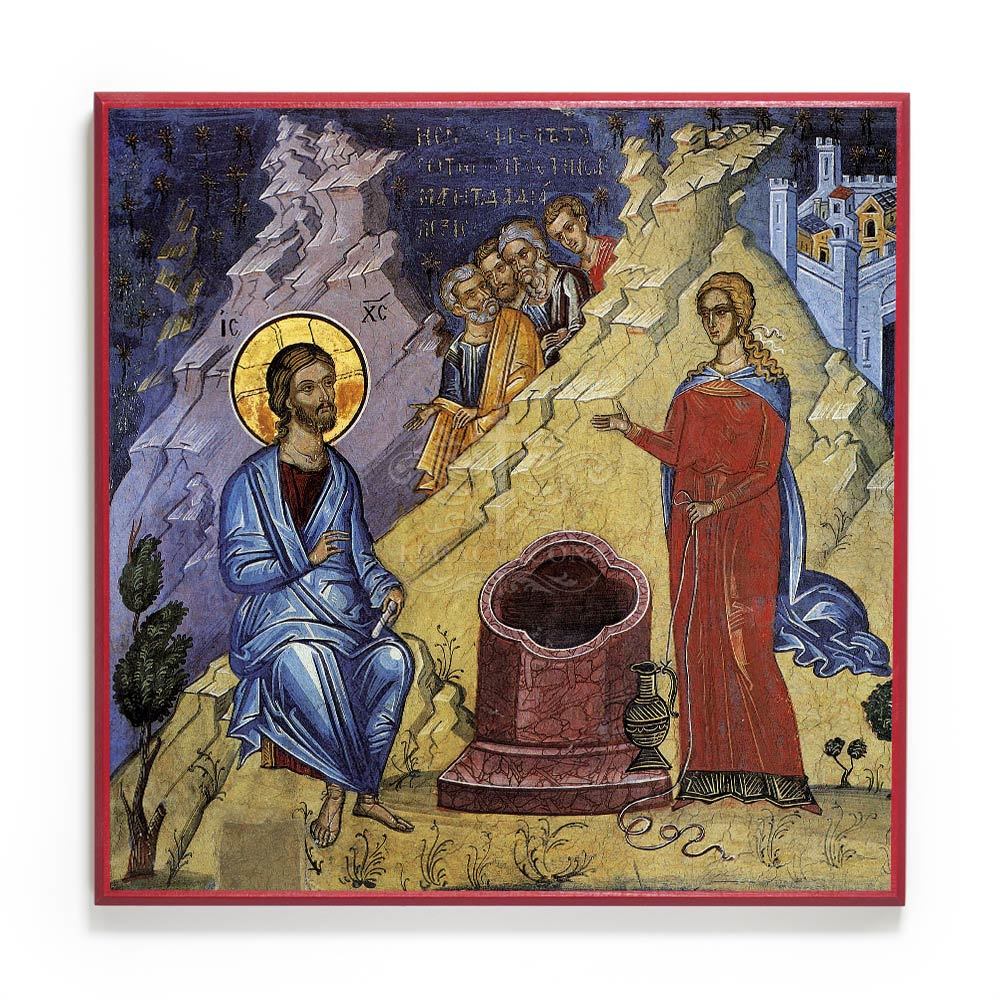 The theme of baptism continues in this Sunday’s Gospel, re-affirming that Pascha is a feast of resurrection and of baptism, being born into eternal life. The center of Jesus’ conversation with this unnamed woman (the Church later gave her the name Photine, the “enlightened woman”) is about water. They met at Jacob’s well, a place of great tradition, a sign and a promise of God’s love and mercy for his people. Jacob’s well provided the riches of water to a desert place, the sign that God would always provide for and bless his people. However, the encounter with the woman reveals something more: Jesus is the Messiah to come, he is greater than the Patriarch Jacob. The water of Jacob’s well is only for this world, Jesus would give “the water that would become a spring of water welling up to eternal life” (John 4:14). This clearly refers to our baptisms, as it comes immediately after the comparison of Jesus with John the Baptist, and the baptisms done by Jesus’ disciples
The theme of baptism continues in this Sunday’s Gospel, re-affirming that Pascha is a feast of resurrection and of baptism, being born into eternal life. The center of Jesus’ conversation with this unnamed woman (the Church later gave her the name Photine, the “enlightened woman”) is about water. They met at Jacob’s well, a place of great tradition, a sign and a promise of God’s love and mercy for his people. Jacob’s well provided the riches of water to a desert place, the sign that God would always provide for and bless his people. However, the encounter with the woman reveals something more: Jesus is the Messiah to come, he is greater than the Patriarch Jacob. The water of Jacob’s well is only for this world, Jesus would give “the water that would become a spring of water welling up to eternal life” (John 4:14). This clearly refers to our baptisms, as it comes immediately after the comparison of Jesus with John the Baptist, and the baptisms done by Jesus’ disciples
We renew our baptism every time we receive Communion, and they are for life, for eternal life, from God, the giver of life. A couple of observations: as for Nathaniel, Jesus signs his ministry with intimate knowledge of the people he meets. He sees Nathaniel under the fig tree, and he tells the woman about her five husbands. In both cases, they become his disciple because of his knowledge of him. This is a theme of John’s Gospel, the shepherd knows his sheep and his sheep know him. Second, it should be to our wonder that Jesus always comes to the most underprivileged. To whom does he reveal the mystery of eternal life in baptism: to the paralytic who had no friends, to the woman who had led a shameful life, and came to the well at noon who no one else would be there, and to the blind man suspected of sin because of his blindness. And the disciples marvel that Jesus speaks to a woman! Not just any woman, but a heretical, decadent Samaritan woman! Are we humble enough to accept Jesus as our Messiah?
Meditation by Archpriest David Petras
#ByzantineCatholicNewHaven